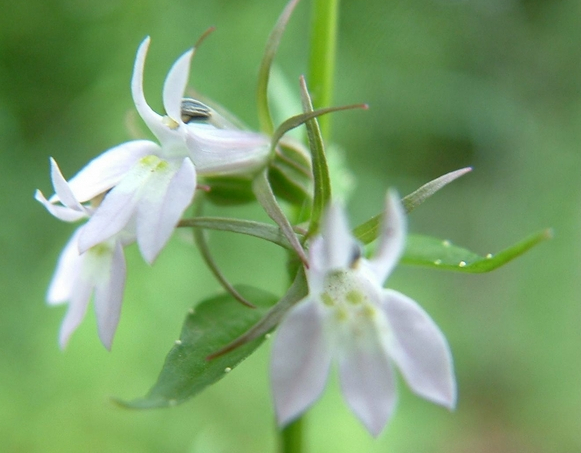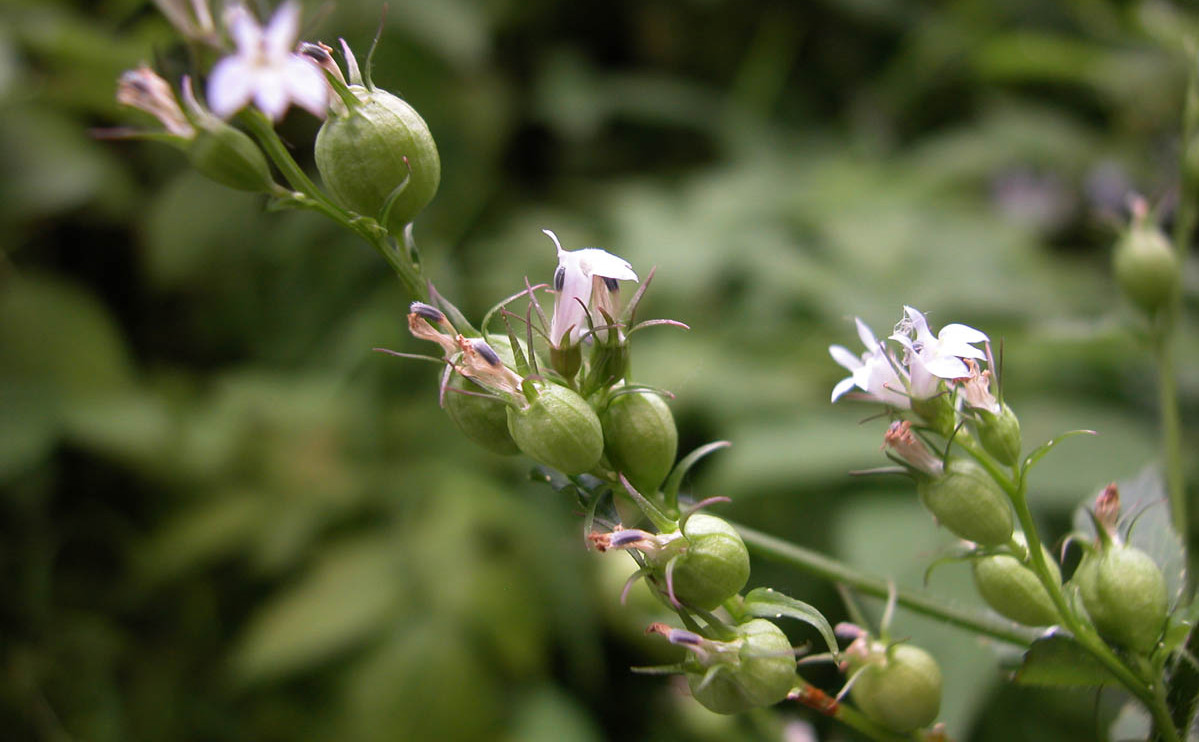
Lobelia (Lobelia inflata), also known as Indian tobacco and puke-weed, has been used as a medicine for a very long time. The herb was very popular with several Native American tribes, who ranked it high in their materia medica. Its value was such that it was used as an article of trade among them. Several tribes reported to have used it are the Penobscot, Cherokee, Iroquois, Shoshone, and Crow. More on that later.
Following are health problems and conditions that have been shown to respond to Lobelia, either alone or in combination with other herbs.
Conditions that Respond to Lobelia Herb
- bronchitis
- cough
- asthma
- muscle cramps
- menstrual cramps
Herbalists have treated bronchitis, asthma and other respiratory conditions with lobelia for centuries, and modern science has proven the herb effective for those complaints (and others). There are even over-the-counter cold remedies that contain lobelia extract.
“One of lobelia’s main benefits may be its ability to offer support for breathing difficulties. Equestrian studies have discovered that horses injected with lobelia allowed them to breath deeper. It is believed that lobelia stimulates the adrenal glands to release epinephrine, in effect, this relaxes the airways and allows for easier breathing. Lobelia also has strong anti-spasmodic properties, which means it helps to relax smooth muscles. This has lead to its inclusion in remedies for spasmodic coughs related to croup, bronchitis, and laryngitis. Lobelia is also found in many over-the counter cold remedy applications.”1
Lobelia doesn’t just allow easier breathing, the herb has been shown to immediately relieve asthma attacks. And the herb doesn’t have to be taken as a tincture, infusion, capsule or tablet. Lobelia can also be inhaled from a vaporizer.
“Deeming lobelia one of the world’s most powerful healing herbs, famed Master Herbalist Dr. John Christopher used it often for relieving acute asthma attacks. His Herbal Legacy site notes that there hasn’t been one proven death from lobelia. Even the FDA realized you’d have to consume four pounds in one sitting to invite the grim reaper. Lobelia actually offers almost immediate relief during those periods of excess congestion and breathing difficulties often associated with asthma, COPD and bronchitis. In addition to consuming it in tincture form, it’s chopped up weed can be inhaled from a vaporizer.”2
The Cherokee mashed the roots of lobelia and used them as a poultice for body aches. The Iroquois also used the root, to treat venereal diseases, ulcers, and leg sores. The Crow used the plant in religious ceremonies.
As an expectorant, Lobelia was considered an acceptable runner-up to extract of gumwood, which was their favored expectorant. The Shoshones are one tribe known to have used Lobelia tea as an emetic (a substance used to induce vomiting). They employed “puke weed” as a therapeutic modality. This also helps to illustrate why lobelia is not dangerous, under normal circumstances. It takes a rather large amount of lobelia to induce vomiting, and an even bigger amount to be a danger to one’s health. In other words, you will puke up the herb long before you can consume enough to endanger your life.
For treating muscle spasms, Dr. Christopher’s Herbal Legacy offers the following instructions:
“For internal spasms (such as in the stomach area) give a few drops of lobelia tincture each half hour.”3
As a natural muscle relaxant, Lobelia has often been employed throughout history in midwifery, to relax the pelvic muscles in preparation for childbirth. Today, Lobelia is commonly used to calm the nerves and act as a natural sedative, mild laxative and powerful antispasmodic.
It’s even been speculated that Lobelia may enhance hormone production, but that has yet to be proven definitively. Lobelia has proven to be helpful for angina pectoris, bronchial asthma, cramps, dysmenorrhea, epilepsy, hyperactivity, inflammation, spastic bowel, swelling and ulcers. Lobelia’s muscle-relaxing properties help ease muscle tension and inflammation, making Lobelia useful for back problems, muscle pulls, sprains and tension headaches.
My Lobelia Experience
My own personal experience with Lobelia has always been a positive one. I’ve used Lobelia for more than sixteen years now, mostly to treat cramps – usually menstrual cramps, but occasionally leg cramps and muscle spasms, caused by too much exercise.
How I Use Lobelia:
Lobelia can be purchased as whole herb, cut and sifted, powdered or as a tincture. I have always preferred powdered Lobelia, for two reasons: 1) less waste and 2) lower cost.
I purchase empty 00 capsules separately and fill them, tightly, using two simple tools: ordinary wax paper and a butter knife. I also use a cheap, household dust mask, to prevent inhaling bits of herb powder as I work.
I’ve saved a LOT of money over the years, by purchasing the powder and capsules separately. It also means no recycling containers overflowing with empty Lobelia bottles, at the end of each year. A victory for the planet and my bank account.
I have never taken more than two capsules in a 4 to 5-hour period, but you would be wise to consult an herbalist or naturopathic physician on what dosage you may require for whatever ails you. Just remember, when it comes to Lobelia, less is usually more. Two capsules, at once, has always worked within 30-40 minutes, for me. Your results may differ.
Now, for the bad news
People who suffer from hypertension (high blood pressure) should not use Lobelia. Also, pregnant and nursing women, due to Lobelia’s chemical similarity to nicotine; which means people who are sensitive to nicotine should also avoid Lobelia. Lobelia should not be used in “nervous prostration”, shock, paralysis, or poisoning with a depressing substance due to lobeline’s (an alkaloid in Lobelia) depressant effect on preganglionic nicotine receptors.
If you have a history of irregular heartbeat, which I have, you should not use high doses of Lobelia, as it can relax the heart muscle – this means no “Lobelia puke” therapy. If you suffer from dyspnea from an enlarged or fatty heart, and/or valvular incompetence of the heart, you should avoid Lobelia altogether. Furthermore, it should not be employed as an emetic in the very young or elderly, due to the depressant effect of lobeline.
Also, if you aren’t experienced with herbal medicines and have an “if a little is good a lot will be better” attitude toward their use, using Lobelia without supervision is not recommended for YOU.
Lobeline, like nicotine, acts as a stimulant in small dosages, but as a nerve depressant and powerful acronarcotic poison in excessive doses; this is dependent, of course, on your ability to somehow prevent your body from expelling the herb through vomiting.
Lobelia overdose symptoms include
- Nausea
- vomiting
- diarrhea
- coughing
- dizziness
- disturbed hearing and vision
- mental confusion
- weakness
- shivering
- profuse sweating
- tachycardia
- convulsions
- hypothermia
- hypotension
- pinpoint pupils
- paralysis
- respiratory depression
- low blood pressure
- salivation
- stupor
- tachypnea (abnormally rapid breathing)
- tremors
- coma, and in extreme cases death due to respiratory paralysis.
After that long list of scary side effects, I feel it’s important to reiterate that excessive ingestion of lobelia would be difficult and therefore highly unlikely. Large doses of lobelia are an emetic. You would vomit long before you could consume enough to cause coma and death. I should also add that I have not found a single proven case of anyone becoming comatose or dying of respiratory paralysis as a result of lobelia use. And I think we all know that if the powers-that-be could connect a single death with this very useful and inexpensive herb they would.
I first wrote about lobelia six years ago, to promote a valuable herb that can decrease the suffering of many and to oppose the alarmist statements made by a certain syndicated television doctor, who claimed that Lobelia is “dangerous” and “should be avoided”.
As I stated above, used in excess or by those suffering from certain conditions, lobelia does have the potential to be hazardous to one’s health. But the same can be said of ALL prescription and over-the-counter drugs. Frankly, any substance, whether created by God or a chemical engineer has the potential to be toxic. Water – second only to oxygen in importance to Human life – drunk in excess, can be lethal. This is an undisputed fact!
You’ll find that, in cases where allergies and pre-existing conditions are not a factor, exceeding recommended dosages is the cause of the “danger” associated with herbal remedies, and even most synthetic drugs. This doesn’t mean that most herbs and pharmaceuticals are inherently dangerous, but poor judgment on the part of the user can create a danger. So, heed the warnings, exercise good judgment, and you will find Lobelia to be a great ally against muscle cramps, spasms, asthma attacks and more.
References
1 Group, Edward, DC, NP, DACBN, DABCN, DABFM. “The Lung Cleansing Benefits of Lobelia”. Global Healing Center, August 31, 2012. Web. December 2016
2 Fassa, Paul. “The 2 Herbs For Asthma, COPD, and Chronic Bronchitis Sufferers”. Natural Society, November 29, 2013. Web. December 2016
3 “Spasms”. Dr. Christopher’s Herbal Legacy, n.d. Web. December 2016
Ehrlich, Steven D, NMD. “Lobelia”. University of Maryland Medical Center, January 2, 2015. Web. November 2016
“Lobelia Herb Benefits”. Annie’s Remedy, n.d. Web November 2016
Weil, Andrew, MD. “Is Lobelia Safe to Use?” Weil, n.d. Web. November 2016


Hi! Thank you for the information. I’ve purchased a tincture in hopes to use it for my children 8 months and 3 years they are dealing with croup. What dosage would be used at these ages? Thank you
Hello. I would strongly suggest you contact a licensed herbalist or naturopathic physician before giving any herb, particularly Lobelia, which is a muscle relaxant, to your very young children. HTH